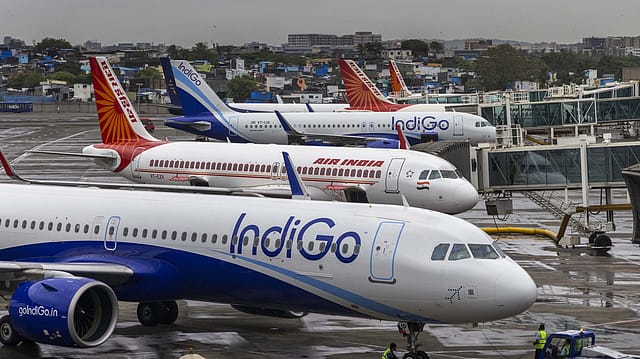Domestic air traffic slumps 43% in Jan as Covid-19 hit
ADVERTISEMENT

India's domestic air traffic plunged by nearly half in January compared with the previous month as the third wave of the Covid-19 pandemic, led by the Omicron variant, peaked across the country.
Domestic passenger traffic slumped by around 43% to an estimated 64 lakh in the first month of 2022 compared with 112 lakh in December 2021, according to a report by rating and research firm ICRA. On a year-on-year basis, the drop was around 17%.
Capacity deployment by airlines for January 2022 was around 7% lower than January 2021, the report says. This comes even as the Ministry of Civil Aviation allowed 100% capacity deployment on domestic routes from October 18, 2021.
On a sequential basis, departures in January were lower by about 27% due to emergence of the new Covid-19 variant, the report says.
The rating agency retained its negative outlook for the aviation sector as it expects the recovery in air traffic to pre-Covid-19 levels to be slow owing to continued restrictions on international travel and subdued demand from the corporate travel segment.
Despite the improving pace of vaccinations, the threat of the new variant has impacted the leisure travel segment too, it warned.
Lower capacity utilisation along with a sharp increase in the aviation turbine fuel (ATF) prices will continue to weigh on the financial performance of Indian carriers in FY2022, the rating agency cautions. ATF prices in February 2022 have been higher by 59.9% on a year-on-year basis due to the low base of February 2021.
ICRA expects industry earnings to be adversely impacted in FY2022 due to lower revenues. Debt levels are likely to remain high for the industry and are estimated to be range bound at around ₹1,20,000 crore (including lease liabilities) for FY2022, the report says.
The aviation industry needs an additional funding support of ₹45,000-47,000 crore over FY2022 to FY2024, the rating agency says.
The domestic passenger traffic in January 2022 is the lowest since August 2021, after the second wave of the pandemic ebbed.
The aviation ministry had reduced the permissible capacity deployment to 50% of pre-Covid levels from June 1, 2021 due to the resurgence of the second wave.
The permissible capacity deployment was gradually increased to 65% from July 5, 2021 further to 72.5% from August 12, 2021 and 85% from September 18, 2021. The ministry removed restrictions on the permissible capacity deployment with effect from October 18, 2021.
Aviation regulator, the Directorate General of Civil Aviation (DGCA), had earlier extended the suspension of scheduled international commercial passenger services to and from India till February 28.
ICRA, however, expects the rollout of e-passports in 2022-23 to enhance travel convenience for passengers which in turn will boost international travel.
Meanwhile, InterGlobe Aviation, the parent of budget carrier IndiGo, posted a surprise profit in the third quarter earlier this month. Net profit of the low-cost carrier rose to ₹129.8 crore for the quarter ended December compared with a loss of ₹620 crore in the year-ago period.